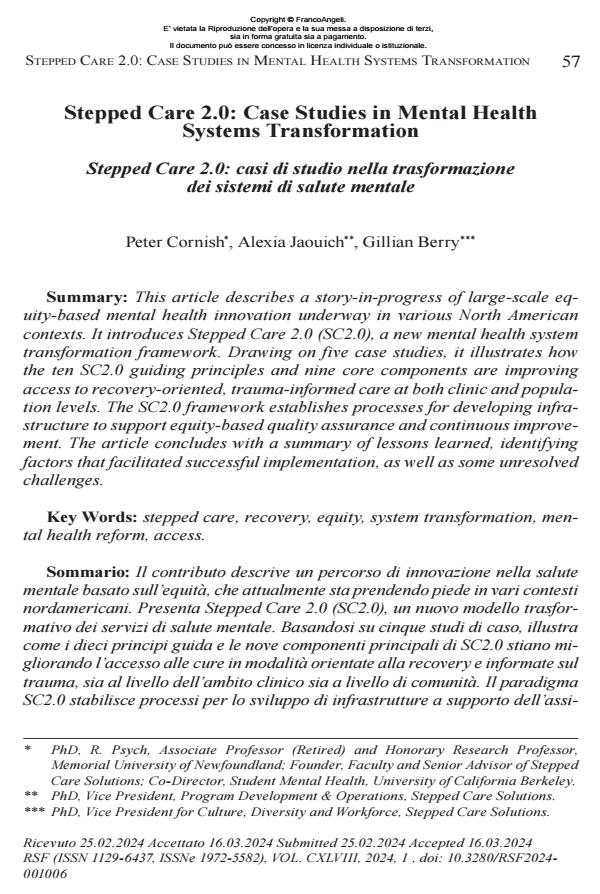Stepped Care 2.0: Case Studies in Mental Health Systems Transformation
Titolo Rivista RIVISTA SPERIMENTALE DI FRENIATRIA
Autori/Curatori Peter Cornish, Alexia Jaouich, Gillian Berry
Anno di pubblicazione 2024 Fascicolo 2024/1
Lingua Inglese Numero pagine 24 P. 57-80 Dimensione file 807 KB
DOI 10.3280/RSF2024-001006
Il DOI è il codice a barre della proprietà intellettuale: per saperne di più
clicca qui
Qui sotto puoi vedere in anteprima la prima pagina di questo articolo.
Se questo articolo ti interessa, lo puoi acquistare (e scaricare in formato pdf) seguendo le facili indicazioni per acquistare il download credit. Acquista Download Credits per scaricare questo Articolo in formato PDF

FrancoAngeli è membro della Publishers International Linking Association, Inc (PILA), associazione indipendente e non profit per facilitare (attraverso i servizi tecnologici implementati da CrossRef.org) l’accesso degli studiosi ai contenuti digitali nelle pubblicazioni professionali e scientifiche.
This article describes a story-in-progress of large-scale eq- uity-based mental health innovation underway in various North American contexts. It introduces Stepped Care 2.0 (SC2.0), a new mental health system transformation framework. Drawing on five case studies, it illustrates how the ten SC2.0 guiding principles and nine core components are improving access to recovery-oriented, trauma-informed care at both clinic and popula- tion levels. The SC2.0 framework establishes processes for developing infra- structure to support equity-based quality assurance and continuous improve- ment. The article concludes with a summary of lessons learned, identifying factors that facilitated successful implementation, as well as some unresolved challenges.
Il contributo descrive un percorso di innovazione nella salute mentale basato sull’equità, che attualmente sta prendendo piede in vari contesti nordamericani. Presenta Stepped Care 2.0 (SC2.0), un nuovo modello trasfor- mativo dei servizi di salute mentale. Basandosi su cinque studi di caso, illustra come i dieci principi guida e le nove componenti principali di SC2.0 stiano mi- gliorando l’accesso alle cure in modalità orientate alla recovery e informate sul trauma, sia al livello dell’ambito clinico sia a livello di comunità. Il paradigma SC2.0 stabilisce processi per lo sviluppo di infrastrutture a supporto dell’assicurazione e miglioramento continuo della qualità basate sull’equità. L’articolo si conclude con un riassunto delle lezioni apprese, identificando i fattori che hanno facilitato il successo del modello, e indica alcune sfide aperte.
Parole chiave:stepped care, recovery, equità, trasformazione di sistemi, riforma della salute mentale, accesso
Peter Cornish, Alexia Jaouich, Gillian Berry, Stepped Care 2.0: Case Studies in Mental Health Systems Transformation in "RIVISTA SPERIMENTALE DI FRENIATRIA" 1/2024, pp 57-80, DOI: 10.3280/RSF2024-001006